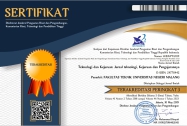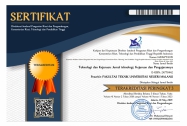Pengaruh Wawasan Kevokasionalan Siswa SMP di Kecamatan Selong Terhadap Minat Melanjutkan di SMK
Abstract
This research aimed to describe (1) how much vocationalization insight that junior high school students had on vocational high school as a working world education (X1), understanding the types of skills (X2), and understanding of the working world (X3) on the interest to continue to vocational high school (Y); (2) how much is the vocationalization insight influence in junior high school students year IX comprised of vocational high school as a working world education (X1), understanding the types of skills (X2), and understanding of the working world (X3) on the interest to continue to vocational high school (Y). This research was survey research using a quantitative approach. The samples were 197 students that were determined using a proportionate random sampling technique. The sample size determination referred to the Isaac & Michael table with 5 percent error rate. The data collection used questionnaire, document, and observation. The data were analyzed using descriptive statistic. The results showed that (1) X1, X2, and X3 variables entered the high category with the percentage values of 60 percent, 57 percent, and 51.2 percent or good variables for the interest to continue to vocational high school; (2) the X1, X2, X3 variables influenced the Y variable with the correlation coefficient of 0.580, 0.564, and 0.479 respectively, and together, X1, X2, and X3 variables influenced the Y variable with the correlation coefficient of 0.727.
Keywords
Full Text:
PDFReferences
Berger & Pilz. (2012). The Role of pre-vocational education in the german realschule: Theory and Practice.Fit for business pre-vocational education in european schools (pp. 119-141). Deutsche Nationalbibliografie: Spinger. Clarke, L. & Winch, C. (2007). Vocational education. internasional approaches, developments and systems. Routledge. 270. Madison Avenue, New York. Du., Xiang-Yun. 2011. Gender and Diversity in a problem and project based learning environment. Aalborg University Denmark: River Publishers. Evans., M.& Syrett., S. (2007). Generating Social Capital : The social economy and local economic development. European Urban and Regional Studies. Fathoni, A., & Ismatullah, K. (2018). Pengaruh Wawasan Kevokasionalan Siswa SMP terhadap Minat Melanjutkan di SMK. Edumatic: Jurnal Pendidikan Informatika, 2(2), 93-102. Hosnan,. M. (2014). Pendidikan saintifik dan kontekstual dalam pembelajaran abad 21.Bogor: Ghalia Indonesia. Lau., Patrick & Fung., Suk-Chun. (2008). School Guidance and Counseling in an International Context.Asian Journal of Counselling, 15 (2): 207–228. Lauglo, J. (2005). Vocationalised secondary education revisited (3-5). In Lauglo, Jon & Maclean, Rupert (Eds) Netherlands: Spinger. Lucas, B., Spencer, E., & Claxton, G. (2012). How to teach vocational education. City & Guilds. Centre For Skills Development. Mardapi., Djmari. (2007). Teknik Penyusunan instrumen tes dan nontes. Yogyakarta. Mitra Cendikia Pavlova., M. (2009). Technology and vocational education for sustainable development. Australia: Spinger. Rofik A., Widodo, R.B., &Yani. (2005). Pemberdayaan pesantren menuju kemandirian dan profesional santri dengan metode daurah kebudayaan. Jakarta Selatan: Pustaka Pesantren. Sudira, Putu. (2012). Filosofi dan teori pendidikan vokasi dan kejuruan. Yogjakarta. Uny Press Sudira, Putu. (2013). Pre-vocational course on primary education. Diambil pada tanggal 19 September 2015, dari http://staff.uny.ac.id/sites/default/files/penelitian/dr-putu-sudira-mp/071-paper-ispe-putu- s-2013-pre-vocational.pdf Sudira, Putu. (2017). TVET ABAD XXI Filosofi, Teori, Konsep, Dan Strategi Pembelajaran Vokasinal. Yogyakarta. Uny Press 2017 Sugiyono. (2014). Metode penelitian kuantitatif kualitatif dan R&D. Bandung: CV. Alfabeta.
DOI: http://dx.doi.org/10.17977/um031v43i12020p20-27
Refbacks
- There are currently no refbacks.
Copyright (c) 2020 Teknologi dan Kejuruan: Jurnal Teknologi, Kejuruan, dan Pengajarannya
Teknologi dan Kejuruan: Jurnal Teknologi, Kejuruan, dan Pengajarannya
E-ISSN 2477-0442 (online)
Contact
Faculty of Engineering, Universitas Negeri Malang (UM)
Jl. Semarang No 5 Malang 65145, Building H5, 1st Floor.
Homepage: http://journal2.um.ac.id/index.php/teknologi-kejuruan
Email: teknologikejuruan.ft@um.ac.id

This work is licensed under a Creative Commons Attribution 4.0 International License.



2.png)
1.png)
1.png)
1.png)
4.png)
1.png)
.png)

3.png)
1.png)
1.png)


